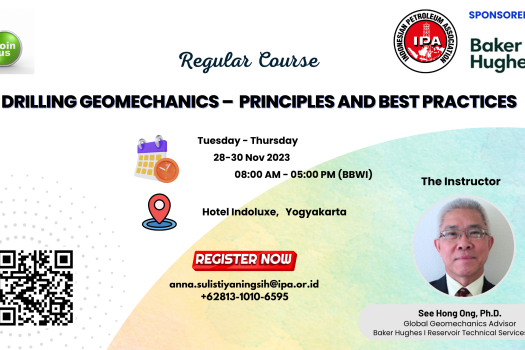IPA Course : Drilling Geomechanics – Principles and Best Practices
.png)
Disciplines Targeted
- Drilling
- Geomechanics
- Formation Evaluation
- Geology - Operations
- Research & Development
This is an intermediate level course for drilling engineers, drilling fluids specialists and geomechanics professionals who want to know more about borehole geomechanics, roles of drilling fluids and operational practices in managing wellbore instability and lost circulation. Geologists, chemists and petro-physicists dealing with geomechanical issues during drilling will also benefit from attending this course.
Course Description
Drilling highly deviated and horizontal wells to increase contact areas for maximizing either hydrocarbon production, geothermal heat extraction or CO2 injection often require traversing trouble zones especially in the overburden sections. Trouble zones are formations or intervals that tend to be more problematic during drilling due to their unique intrinsic properties and/or structural characteristics. The prevalence of borehole instability related problems in trouble zone drilling, such as pack-offs, tight holes, stuck pipes and fluid losses, constitutes one of the largest sources of non-productive time and often results in wells that are delivered without fully meeting the design specifications and stakeholder requirements.
This training focuses on drilling in three trouble zones commonly encountered, namely shales, faults, and coals. Due to their unique fabric and geomechanical characteristics, the focus of this class is on a better understanding of the geomechanical fundamentals specific to drilling these zones. Each trouble zone presents unique challenges that require different approaches to well planning, drilling fluid design and drilling practice. In particular, the physio-chemical changes caused by transport processes in shales and their implications for mechanical and chemical stability will be emphasized. Additionally, the application of wellbore strengthening technique to widen the mud weight window, providing the basis of design for simpler, cheaper and safer wells with fewer casing strings, will be also be presented.
The course demonstrates how enhanced geomechanical understanding can be applied to improve the efficiency of the wellbore construction process including well designs and drilling fluid formulations as well as other operational best practices relevant to drilling optimization. Throughout the course, relevant examples and case studies will be introduced to reinforce theoretical concepts and field applications.
Learning Objective
The aim is to provide the course participants with a broad understanding of some of the geomechanical principles and operational best practices when drilling through trouble zones. Principally, they will learn about the importance of mud weights, mud formulations and good drilling practices in mitigating and managing wellbore stability and lost circulation issues, ultimately leading to improved drilling performance and well delivery efficiency.
Some of the key topics include:
- Basic principles of borehole (geo)mechanics
- (Mechanical) wellbore stability analysis
- Time-dependency in wellbore stability
- Shale transport processes and physio-chemical changes
- Weak-plane failures in shales
- Fault drilling – geomechanical, pre-drill and operational considerations
- Coal drilling – coal geomechanics; drilling considerations and strategy
- Lost circulation fundamentals
- Leak-off test (LOT) re-examined
- Wellbore strengthening – theory and application
- Improved well delivery – integrating geomechanics with well planning and drilling practices
About the Instructor
See Hong Ong, Ph.D.
Global Geomechanics Advisor
Baker Hughes I Reservoir Technical Services (RTS)
See Hong earned his petroleum engineering degrees from the University of Oklahoma and has more than 40 years of worldwide experience in petroleum engineering and petroleum-related geomechanics. His professional careers include 24 years at Baker Hughes where he is serving in various consultancy, technical and managerial capacities, and 17 years at PETRONAS where he had management and operational responsibilities. In advancing the science and application of geomechanics in petroleum engineering, he taught industry short courses and published technical papers in addition to holding several US patents. See Hong received the 2012 SPE Asia-Pacific Region Technical Award in Drilling Engineering and served as a SPE Distinguished Lecturer for the 2017-18 tour season.
How to register:
Please email to : anna.sulistiyaningsih@ipa.or.id or send WA to +62813-1010-6595
Complete the form through the link as required: https://forms.gle/ShnvCNjX9VrX6FUs8


